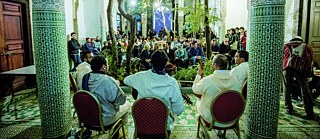Supporting independent culture

Providing training for cultural management is one aim of the Culture Academy, as well as building a network between independent artists, musicians and cultural managers across the Arab region.
At a café alongside the Nile in Cairo are gathered alumni of Goethe-Institut’s Culture Academy: Rim Qutishat from Jordan, Husam Hilali from Sudan and Angie Balata from Egypt. They work in diverse areas of the cultural sector and benefitted building their expertise and contacts through the programme. But the friendship and connections between cultural practitioners from across the Middle East and North Africa region has also endured.
The Culture Academy is a qualification programme for cultural managers from the Arab region, including a six weeks seminar in Berlin, as well as local programmes in Tunisia, Egypt and for Libya. And while the Goethe-Institut runs similar programmes around the word, those carried out in the MENA region have a special resonance for their alumni. In the Arab world many people are unfamiliar with the concept of cultural management, even those working in the field, says Qutishat. Artists often do everything themselves – including writing proposals, applying for funding and creating business plans, without knowing that there is a role for a cultural manager to facilitate these processes. At the same time, the capacity is critical now, since cultural managers play a central role in times of social transformation processes.
Qutishat, who works as a grants coordinator at the Abdul Hameed Shoman Foundation in Jordan, says she was initially surprised to be accepted into the programme as a non-artist. “But then I came to the conclusion that you don't have to be an artist to do all of this, but can equally be a person facilitating the work of people in the artistic scene.”
In Berlin for the six-week programme, the participants stayed in an apartment in the city’s Kreuzberg district. “The biggest advantage of the programme for me was the relationships and the connections I made, the people that I got to know there,” says Hilali a writer and theatre-maker by choice, who also works in media and journalism to pay the bills. Meanwhile, regional events for independent artists and cultural actors from the MENA region are relatively rare, says Hilali, with most events in the region being organised by ministries of cultures within the respective countries, privileging mainstream artists and marginalizing the independent scenes.
“We really don't know much about each other’s countries,” said Hilali, “So this was a great opportunity to learn more about the artistic and cultural situation in other Arab countries, including meeting cultural actors from Palestine. The connections we made we can use to facilitate different kinds of future projects that we want to do.”
Rather than doing a single internship Balata met with many organizations – such as festival organizers, labels, and music commissions – to get an idea about how the independent music scene in Germany manages to keep going without becoming overly commericalised. Still today Balata relies on the contacts she made in Germany for the work she does in the field.
Speaking from Fez in Morocco, Omar Chennafi, a freelance photographer and cultural manager, who also works on fine art photography, credits the Culture Academy training in Berlin as having provided tools to effectively manage cultural events. “A lot of the training didn't make sense at the time, but later when I was carrying out a project, the experience started to make sense, ” says Chennafi, the founder and director of the Fez Gathering, a gathering of international artists in the historical city, which is funded by organisations including the Goethe-Institut and the Germany Embassy.
Understanding better his role as a cultural manager, and even having knowledge of the correct terms and descriptions, have been useful skills, especially when presenting the concept and vision to other cultural organisations, he says. “The training gave me more confidence, and a better understanding of myself, starting to become an entrepreneur.”
Meanwhile, support for independent cultural actors comes at a time when operating in the cultural field has become more difficult in some countries in the MENA region. This is especially the case in Egypt, where a crackdown by the government on rules for funding of NGOs has resulted in many international cultural organizations pulling out of the country, while local entities have no access to funding. Authorities in Egypt have also made it difficult to stage events including concerts and independent music festivals by withholding permits.
Dr. Elke Kaschl Mohni, the MENA Regional Director at the Goethe-Institut, says that at such a time it’s vital to support local initiatives and local structures through capacity building, such as cultural management. “We want to ensure that these initiatives can continue their work even under the current difficult conditions.” One way is to strengthen mutual exchange with workshops like the one in Berlin. The workshop participants returned home with a new perspective. "This is an important reason why we continue," says Kaschl Mohni.
Back to Dialogue & Transition